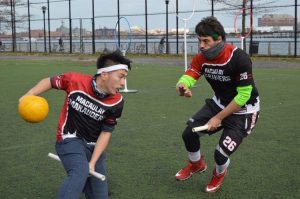Before last March, board members of Hunter College’s Himalayan Club hosted cultural events throughout the semester where -students modeled clothing, enjoyed food, danced to music and played games all in celebration of Himalayan heritage. The last time club members were in the same room was February, two weeks before Hunter and other CUNY schools closed their campuses to stop the spread of COVID-19.
Now instead of in-person hang-outs, club members interact via Zoom, Discord and social media.
“The club itself is about people coming together and the human interaction the club provides,” said Sonam Sherpa, president of the Himalayan Club. “But now we are working extra hard to use the virtual format.”
The Himalayan Club is not alone. As widespread physical interaction remains unsafe, some student clubs use social media to maintain their communities online.
Older club members are concerned with carrying on the club’s legacy. So, Sherpa and his team hosted Instagram story takeovers to entice Hunter students to become a part of the group.
“We’re trying to recruit incoming students and give them the club experience, have them invest time in the club and build relationships with people,” said the economics major.
The Macaulay Honors College Quidditch team also takes advantage of social media to sustain its community. While in the past the club only used its social media accounts to promote its regional or national competitions, the club is now promoting virtual quidditch practices and other upcoming virtual club events, according to Lorraine McShea, club president.
“We’ve been putting a lot of emphasis on social media,” McShea said.
Before the pandemic, the Macaulay Marauders would workout, shoot balls, ride broomsticks, practice their team positions and play scrimmages. Now they only do light stretches, push-ups, sit-ups and other exercises during Zoom practices to maintain their physical fitness.

McShea and her teammates would also hang out frequently at restaurants or each other’s dorms. Now that they only see each other during virtual practice, McShea says that social media is a helpful way of connecting with her team.
“I think people see that there is a community that is still connected even though times are tough and we can’t see each other in person,” she said. “It says a lot about the team. It says a lot about the club.”
While social media is one way of connecting with others online, some find that adapting to it is challenging. Along with being a “face-to-face person,” Mitsuca Frederic, vice president of the Haitian Student Association at Hunter, said that it is difficult to constantly answer student inquiries about the club and Hunter via Instagram messaging.
“A lot of the time I work so I’m not on my phone so people could be reaching out and I may not get back to them as often as I would like,” Frederic said, who is mainly responsible for handling the club’s social media.
Nevertheless, she is thankful that the other executive board staff members take up the responsibility when she cannot, which creates a useful line of communication between the club and its members.
“It helps by making sure that we don’t leave anyone unanswered and it creates a space where members can come to us whenever they need help with anything and be guaranteed an answer,” the 21-year-old said.
Club enrollment at Hunter remains similar to last year. There were about 109 clubs eligible for registration as clubs for the 2019-20 academic year, according to an email from Hunter’s Office of Student Activities. Currently, there are about 105 clubs eligible for registration this year.
Along with maintaining the community within a club, Hunter’s Undergraduate Student Government wants to nurture the community between clubs. They often post about different clubs via Instagram, Facebook, and Twitter.
“We’re trying to bring the community between all the clubs rather than just have every club do their own thing the whole time so Hunter feels more like Hunter instead of divided,” said Priyal Thakkar, USG cultural affairs commissioner.
Even though Thakkar says that adapting to a virtual setting has been a learning curve for everyone, she says that she is optimistic about club interaction this year.
“I’m hopeful for this year, even though we’re online,” she said.

